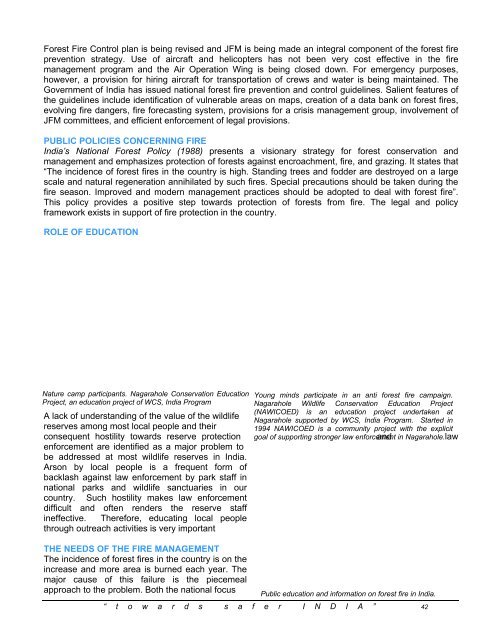Hazards, Disasters And Your Community - United Nations ...
Hazards, Disasters And Your Community - United Nations ...
Hazards, Disasters And Your Community - United Nations ...
Create successful ePaper yourself
Turn your PDF publications into a flip-book with our unique Google optimized e-Paper software.
Forest Fire Control plan is being revised and JFM is being made an integral component of the forest fire<br />
prevention strategy. Use of aircraft and helicopters has not been very cost effective in the fire<br />
management program and the Air Operation Wing is being closed down. For emergency purposes,<br />
however, a provision for hiring aircraft for transportation of crews and water is being maintained. The<br />
Government of India has issued national forest fire prevention and control guidelines. Salient features of<br />
the guidelines include identification of vulnerable areas on maps, creation of a data bank on forest fires,<br />
evolving fire dangers, fire forecasting system, provisions for a crisis management group, involvement of<br />
JFM committees, and efficient enforcement of legal provisions.<br />
PUBLIC POLICIES CONCERNING FIRE<br />
India’s National Forest Policy (1988) presents a visionary strategy for forest conservation and<br />
management and emphasizes protection of forests against encroachment, fire, and grazing. It states that<br />
“The incidence of forest fires in the country is high. Standing trees and fodder are destroyed on a large<br />
scale and natural regeneration annihilated by such fires. Special precautions should be taken during the<br />
fire season. Improved and modern management practices should be adopted to deal with forest fire”.<br />
This policy provides a positive step towards protection of forests from fire. The legal and policy<br />
framework exists in support of fire protection in the country.<br />
ROLE OF EDUCATION<br />
Nature camp participants. Nagarahole Conservation Education<br />
Project, an education project of WCS, India Program<br />
A lack of understanding of the value of the wildlife<br />
reserves among most local people and their<br />
Young minds participate in an anti forest fire campaign.<br />
Nagarahole Wildlife Conservation Education Project<br />
(NAWICOED) is an education project undertaken at<br />
Nagarahole supported by WCS, India Program. Started in<br />
1994 NAWICOED is a community project with the explicit<br />
consequent hostility towards reserve protection goal of supporting stronger law enforcement and in Nagarahole. law<br />
enforcement are identified as a major problem to<br />
be addressed at most wildlife reserves in India.<br />
Arson by local people is a frequent form of<br />
backlash against law enforcement by park staff in<br />
national parks and wildlife sanctuaries in our<br />
country. Such hostility makes law enforcement<br />
difficult and often renders the reserve staff<br />
ineffective. Therefore, educating local people<br />
through outreach activities is very important<br />
THE NEEDS OF THE FIRE MANAGEMENT<br />
The incidence of forest fires in the country is on the<br />
increase and more area is burned each year. The<br />
major cause of this failure is the piecemeal<br />
approach to the problem. Both the national focus<br />
Public education and information on forest fire in India.<br />
“ t o w a r d s s a f e r I N D I A ” 42

















